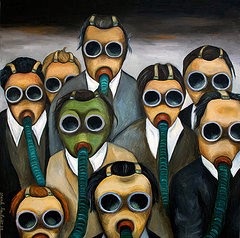Does your organization have some toxic micro-cultures?
If so, you ignore them at your peril.
Much is written these days about the importance of culture in boosting an organization’s success. Strategy is important, as are talent, business models, innovation, and more. But culture, “how we do things here,” as we like to define it, can be the trump card, because it permeates everything in an organization.
Culture is what people do when the boss is not around. Wise leaders craft the culture purposefully and make the desired behaviors explicit and clear.
The Impact of Culture on Ethical Behavior
Culture can have a big impact on whether people act ethically, honorably, and responsibly.
For example, when direct supervisors were observed to behave unethically:
- 42% of employees felt pressure to behave unethically
- 89% observed unethical conduct in the organization
- 40% did not report misconduct
But when direct supervisors were perceived as behaving ethically:
- 17% of employees felt pressure to behave unethically
- 44% observed unethical conduct
- 3% did not report misconduct
(Source: Ethics Resource Center, 2012, cited in Laasch & Conaway, Principles of Responsible Management, Cengage Learning, 2015)

Leadership Derailers Assessment
Take this assessment to identify what’s inhibiting your leadership effectiveness. It will help you develop self-awareness and identify ways to improve your leadership.
Except for very small organizations, culture is not a homogeneous whole. In most organizations, there are sub-cultures.
A multinational headquarters office may have a sub-culture that is exemplary in its compliance with laws and regulations, while an overseas subsidiary operating in a developing country may use bribes to government officials, with the (improper) rationalization that it is a norm of business in that country, so it must do it in order to compete.
A mid-sized, privately held corporation may have an overall culture of quality services and ethical practices. Their finance organization may have a micro-culture of professionalism with strict accountability for deadlines and generally accepted accounting principles, while their sales organization, incented by large commissions, may have a micro-culture that is fast and loose, pushing the edges of the truth envelope with customers, and partying often.
A jarring example of this comes from Bill George, former CEO of Medtronic, whom we interviewed for Triple Crown Leadership. He told us:
“In the old days, no one wanted to ask what the overseas distributors did. Their independence was a shield for unethical behavior, as long as they signed a statement indicating they would be ethical.
A former general counsel of Medtronic said, “Don’t ask too much about what the distributors do.” I learned certain Korean distributors were providing prostitutes for physicians after they had implanted their pacemakers. I asked the head of international to send a letter that day terminating all four distributors. Everyone said, ‘You won’t have anyone in Korea.’ I said, ‘We’ll start over. We don’t tolerate unethical behavior.’”
Another CEO of a Fortune 500 company told us about discovering that many of the people in an autonomous, specialty department were watching pornography online during working hours. The department would be difficult to replace, but the firm terminated many of the personnel.
It is perfectly fine for groups in organizations to have micro-cultures of their own. Such sub-cultures help develop an esprit-de-corps.
The important point is to ensure the micro-cultures, even with their unique approaches, are compatible with the organization’s overall culture and that everyone in the organization is clear on what we call the “ethics imperative”: the need to do the right thing, even when it’s costly or hard).
Leaders ignore toxic micro-cultures at their peril.
Tools for You
- Leadership Derailers Assessment to help you identify what’s inhibiting your leadership effectiveness
- Personal Values Exercise to help you determine and clarify what’s most important to you
- Alignment Scorecard to help you assess your organization’s level of alignment
Related Articles
- “Toxic Leaders, Susceptible Followers”
- “The Problem of Bad Leaders—And Why We Keep Following Them”
- “The Importance of Integrity in Leadership”
- “The Root Causes of Ethical Failings (and Our Political Dysfunction)”
- “Are You Working for an Unethical Organization?”
- “What to Do If You Work for an Unethical Organization”
- “What to Do If You Work for a Toxic Boss”
- “Why Are We Talking about Ethics?”

Triple Crown Leadership Newsletter
Join our community. Sign up now and get our monthly inspirations (new articles, announcements, opportunities, resources, and more). Welcome!
+++++++++++++++++++++++
Gregg Vanourek and Bob Vanourek are leadership practitioners, teachers, and award-winning authors (and son and father). They are co-authors of Triple Crown Leadership: Building Excellent, Ethical, and Enduring Organizations, a winner of the International Book Awards. Check out their Leadership Derailers Assessment or get their monthly newsletter. If you found value in this, please forward it to a friend. Every little bit helps!

